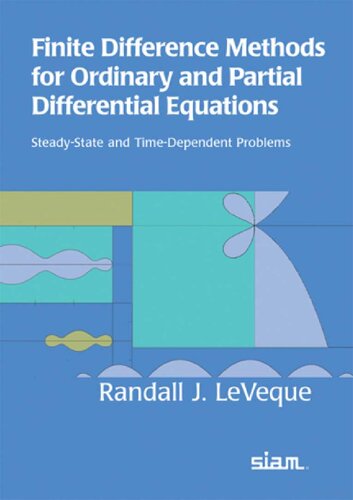

Most ebook files are in PDF format, so you can easily read them using various software such as Foxit Reader or directly on the Google Chrome browser.
Some ebook files are released by publishers in other formats such as .awz, .mobi, .epub, .fb2, etc. You may need to install specific software to read these formats on mobile/PC, such as Calibre.
Please read the tutorial at this link: https://ebookbell.com/faq
We offer FREE conversion to the popular formats you request; however, this may take some time. Therefore, right after payment, please email us, and we will try to provide the service as quickly as possible.
For some exceptional file formats or broken links (if any), please refrain from opening any disputes. Instead, email us first, and we will try to assist within a maximum of 6 hours.
EbookBell Team

5.0
40 reviewsThe book is organized into two main sections and a set of appendices. Part I addresses steady-state boundary value problems, starting with two-point boundary value problems in one dimension, followed by coverage of elliptic problems in two and three dimensions. It concludes with a chapter on iterative methods for large sparse linear systems that emphasizes systems arising from difference approximations. Part II addresses time-dependent problems, starting with the initial value problem for ODEs, moving on to initial boundary value problems for parabolic and hyperbolic PDEs, and concluding with a chapter on mixed equations combining features of ODEs, parabolic equations, and hyperbolic equations. The appendices cover concepts pertinent to Parts I and II. Exercises and student projects, developed in conjunction with this book, are available on the book s webpage along with numerous MATLAB m-files.
Readers will gain an understanding of the essential ideas that underlie the development, analysis, and practical use of finite difference methods as well as the key concepts of stability theory, their relation to one another, and their practical implications. The author provides a foundation from which students can approach more advanced topics and further explore the theory and/or use of finite difference methods according to their interests and needs.
Audience: This book is designed as an introductory graduate-level textbook on finite difference methods and their analysis. It is also appropriate for researchers who desire an introduction to the use of these methods.
Contents: Preface; Part I: Boundary Value Problems and Iterative Methods. Chapter 1: Finite Difference Approximations; Chapter 2: Steady States and Boundary Value Problems; Chapter 3: Elliptic Equations; Chapter 4: Iterative Methods for Sparse Linear Systems; Part II: Initial Value Problems. Chapter 5: The Initial Value Problem for Ordinary Differential Equations; Chapter 6: Zero-Stability and Convergence for Initial Value Problems; Chapter 7: Absolute Stability for Ordinary Differential Equations; Chapter 8: Stiff Ordinary Differential Equations; Chapter 9: Diffusion Equations and Parabolic Problems; Chapter 10: Advection Equations and Hyperbolic Systems; Chapter 11: Mixed Equations; Appendix A: Measuring Errors; Appendix B: Polynomial Interpolation and Orthogonal Polynomials; Appendix C: Eigenvalues and Inner-Product Norms; Appendix D: Matrix Powers and Exponentials; Appendix E: Partial Differential Equations; Bibliography; Index.